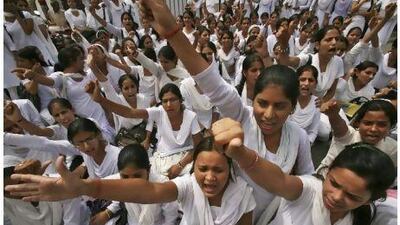NEW DELHI // The Indian activist Anna Hazare declared victory yesterday in his fight against corruption, and will end his 12-day hunger strike today.
"For 12 days the country's people have stood here - it is their victory," said Mr Hazare, 74, who lost 7.5 kilograms during his hunger strike. Tens of thousands of people had gathered at the Ramlila grounds in Delhi to show their support for his cause.
"At 10am tomorrow I want to break my fast among all of you," he said. "You have to celebrate, but with peace. Don't disturb the peace. Victory to Mother India, hail the motherland, long live the revolution."
The lower house of India's parliament unanimously adopted a resolution yesterday on three of Mr Hazare's demands to be included in an anti-corruption bill: that lower-level bureaucrats can be investigated and prosecuted for corruption, the formation of state-level anti-corruption bureaus and a citizens' charter in government institutions. Parliament will vote on the bill tomorrow.
Before Mr Hazare announced the end of his strike, Surinder Pratap Chavan stood in the masses gathered at the grounds, craning his neck for a better view of his "guru". "Even a glimpse of him is divine," he said.
From several hundred metres away, Mr Hazare looked like nothing more than a speck on stage as he rested on pillows dressed in white. However, the crowd of more than 45,000 people showed how big his influence has been. Singers, Bollywood stars, schoolchildren, poets and other supporters shared the stage with Mr Hazare as they sang, danced and addressed the crowd.
The crowd that gathered had answered Mr Hazare's call to press the government to pass the Jan Lokpal Bill - Mr Hazare's version of an ombudsman bill designed to stamp out corruption. The gathering was attended by all walks of life: students, snake charmers, holy men, homemakers, as well as Lal Bihari Mritak, head of the Association of Dead People - an advocacy group that represents people who were wrongly declared deceased by the Indian bureaucracy.
Mr Mritak, 56, from Uttar Pradesh, arrived at the Ramlila Grounds a week ago. He has spent his days chanting slogans and his nights sleeping under tarpaulins, avoiding the monsoon rains.
"I am not here for me," Mr Mritak said. "I have had justice done finally but I am here to represent all those people who are yet to receive justice."
After a land dispute with his cousins in 1978, Mr Mritak came home one day to find an official death certificate in his name and the property transferred to his relatives. He fought for 18 years to establish that he was alive.
"I was buried alive under the corruption of bureaucracy for many years," said Mr Mritak.
He shared his space with a dozen sadhus, or holy men, who travelled almost 800 kilometres to New Delhi from Benares, in Uttar Pradesh, when they heard Mr Hazare was going to fight corruption.
"We have given up all the comforts of the world," said Gangadas Mahatyagi, 55. "But the inflation and corruption makes it impossible for us to live honest lives. We cannot access any government services for our health without paying a bribe."
Sonu Singh, 17, and four of his friends skipped school to join Mr Hazare at the protest grounds.
"We were here last week with a bigger group to chant slogans against the government," said Sonu. "But we decided against a bigger group this time because last time, some of them got distracted and started teasing girls who were here for the protest."
Saroja Devi, 29, a homemaker, arrived with her mother-in-law, Sushila Devi, 56, a teacher, and her five-year-old daughter, Tanisha. They travelled five hours from the nearby state of Haryana to reach Ramlila.
Mrs Devi is not a homemaker by choice. She has a teaching degree but her family has been unable to "buy" her employment.
"You have to know the lackey of some powerful politician and you need to have at least a few bags of money to grease those wheels," Saroja Devi said. "Without these connections I cannot find work."
Times have changed, said her mother-in-law. "In my time I did not have to pay a single rupee to get a job," said the elder Mrs Devi. "You worked hard to receive your qualifications, then you served the country. Now, if you want to make an honest living, you have to pay a corrupt politician first. Why?"
sbhattacharya@thenational.ae
* With additional reporting by Agence France-Presse and Associated Press

Indian anti-graft activist claims victory and will end hunger strike
The lower house of India's parliament unanimously adopted a resolution yesterday on three anti-corruption provisions demanded by an activist who has been on a hunger strike.
Most popular today
